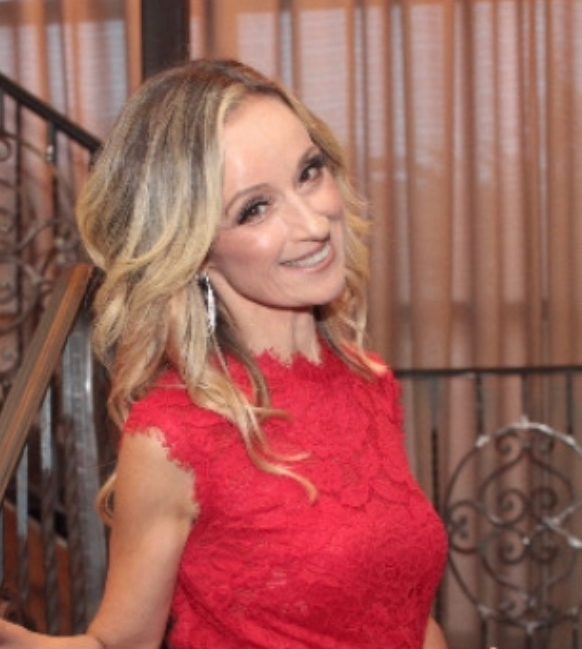The New Normal is Digital: A NYC Public School Teacher Shares Her Experience since COVID-19
An interview and discussion with Antoniette DiGregorio, P.S. 88 The Seneca School
By Shana Alford
Aug. 14, 2020
 As schools reopen this fall – often with a continuation of virtual education – Common Threads will be featuring educators who are learning how to do their jobs differently given the constraints of COVID-19.
As schools reopen this fall – often with a continuation of virtual education – Common Threads will be featuring educators who are learning how to do their jobs differently given the constraints of COVID-19.
After schools closed in New York City in March 2020, due to COVID-19, Antoniette DiGregorio, a special education teacher liaison, veteran elementary school teacher and wellness advocate, experienced the best and the worst of virtual education. She is not alone.
DiGregorio recalls the chaos that ensued as she and her colleagues found out they needed to quickly transition to virtual education.
“Sunday night we found out that schools were closing and by Wednesday we had to be out of the building,” DiGregorio said. “We had three days to quickly figure out how to transition remotely.”
This experience was overwhelming to say the least. A lot of veteran teachers had been teaching 20 or more years and were not used to so much change. They needed immediate training and support for this new online system so the administration created groups, online webinar videos to support them with this shift.
DiGregorio and many of her colleagues had to quickly rely on technology as a critical tool for teaching and communicating with students and their families.
“I sent so many emails, text messages and posted content on various streams, including Class Dojo, Google Chat, Google Classroom,” DiGregorio said.
While the New York City Department of Education invested significantly to make sure all children had access to Internet and computers, still, achieving 100 percent attendance and assignments completed was difficult. Mental health arose as an early concern for students.
Some students were there every day and eager, while others were not. This was a shared experience for many teachers. For students who had less support because parents had to work outside the home, they were typically less engaged in remote learning.
After recognizing that students were lonely, families were getting sick and kids were upset, DiGregorio realized that at times, all she could do was try to be an anchor.
“My biggest concerns with my students and their families was not being able to provide them with that live human connection that all students and adults need,” DiGregorio said.
She realized her role was to keep some type of normalcy during a crazy time. However, for kids with special needs, remote learning was often really difficult. Using her wellness and health training, she initiated mindfulness and yoga classes for families to provide them with the techniques and tools to cope with the uncertainty and trauma they have had to face in the recent months.
However, educators were also facing challenges, alongside students. Many had to balance personal and professional life issues, including making sure their own children were actively participating in virtual education and dealing with loved ones who may have contracted COVID-19. In DiGregorio’s case, she reflects on the supportive school administration who really cared.
DiGregorio also incorporated Common Threads curriculum into her lessons to introduce food and nutrition into her virtual classroom. As a wellness advocate, DiGregorio participated in Seed-to-Table, a partnership with Edible Schoolyard NYC and was very familiar with nutrition education and health training. She observed that kids loved Common Threads’ Small Bites nutrition education lessons.
“I heard about Common Threads through our parent coordinator, and my first experience teaching it was remote,” DiGregorio said. “I would definitely like to continue Small Bites in the fall because my students would benefit from health and wellness education. You can apply it to life outside of the classroom.”
DiGregorio mentioned that while the program was great for helping children learn about healthy food and snack-making, it was sometimes challenging to implement the program when children didn’t have the ingredients being used during a lesson.
As the summer winds down, DiGregorio and her colleagues are facing an opening of the fall semester that will potentially include some in person instruction, with options being discussed for fully remote, hybrid or alternating schedules.
“Although we all feel a sense of uncertainty about reopening in September, we will work together to do what’s best for our students,” DiGregorio said.
About Antoniette DiGregorio
After teaching elementary school/special education for 23 years, grades K-5, on various subjects including social studies, science, health, and physical education, Antoniette DiGregorio transitioned to teaching yoga and mindfulness. Although she currently teaches a 3rd, 4th and 5th grade special class, she remains a full-time wellness advocate. She is a teacher in Ridgewood, a community in Queens, the most diverse county in the United States, with over 130 languages spoken, including ethnic enclaves such as Polish, Egyptian, Asian, African-American/Black and Caucasian Americans.